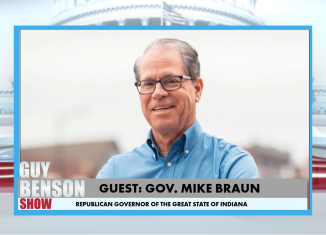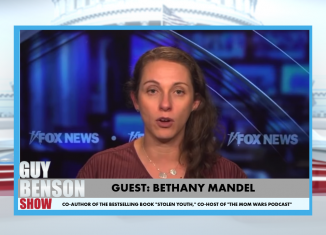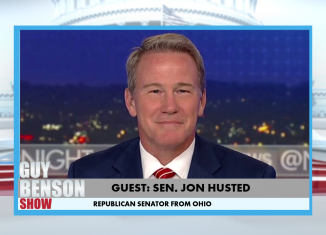“FAILURE IS NOT AN OPTION”: Sen. Majority Leader John Thune Discusses Next Steps Following the House’s Budget Resolution Passage
Senate Majority Leader John Thune (R-SD), the longtime senator from South Dakota and newly minted majority leader as of January 2025, joined The Guy Benson Show today to discuss the House’s passage of the Senate’s version of the budget resolution–calling it a critical step forward in advancing President Trump’s economic agenda. Thune emphasized the importance of finalizing the budget to prevent tax hikes on everyday Americans and outlined what comes next in the legislative process. He also weighed in on the future of the TikTok ban, as Trump extends the app’s operation despite the law on the books. Finally, Benson and Thune closed out by reflecting on his first 100 days leading the Senate GOP. Listen to and read the full interview below!
Listen to the full interview below:
Listen to the full podcast below:
Read the full transcript:
GUY BENSON, HOST, “THE GUY BENSON SHOW”: Joining us now is the Senate majority leader, John Thune, a Republican from South Dakota.
Senator, welcome back to the show.
SEN. JOHN THUNE (R-SD): Hey, good to be with you, Guy, Always.
BENSON: Well, earlier today, late this morning, the House did something very significant. House Republicans barely, by a vote of 216 to 214, passed the budget resolution to align the House and the Senate together.
Talk about the significance. I know that sounds very in the weeds to a lot of people, but tell us about why it really matters, what the House did today.
THUNE: Well, as you know, Guy, it’s necessary.
The budget resolution is the first step in unlocking the next step, which is called budget reconciliation. And that’s where we can achieve the president’s agenda. And when you have unified control of the government, House Senate and White House, you have a unique opportunity in the Senate to be able to do things at 51 votes that would normally take 60.
The Senate, typically, it’s a supermajority to get anything consequential done. Reconciliation is the exception to that, made available only when you have House, Senate and White House. So, because we have those, we have a unique opportunity in time, something that only comes along — and if you look back in the annals of history, it’s only happened five times in the last century, where the Republicans have had House, Senate and White House at the same time.
And four of those five times, we only had it for two years. So we want to make the most of this opportunity but enables us to move the agenda that the president, the House leadership and our colleagues here in the Senate want to get done.
And that’s, of course, making permanent the 2017 tax law, making sure we don’t have a $4 trillion tax increase at the end of the year on the American people, restoring American energy dominance, securing the border, and obviously doing something about spending and deficit reduction. Those are all big priorities in this.
And we want to rebuild our military. We have got a lot of priorities, and I think most of which can get addressed in this reconciliation bill. So this was a key step in that. And nothing about it was easy.
(LAUGHTER)
THUNE: We were — I was meeting with some House members yesterday afternoon. And we did, as you know, I think, a news conference this morning with the speaker, in which we talked about how aligned we are and the things we want to get done together.
And so, fortunately, the House delivered. And we will be able to move this process forward.
BENSON: Yes, by the skin of their teeth, but a win is a win. And our colleague here at FOX Chad Pergram always talks about the math. He also talks about the roughly eight steps it would take from introduction to presidential signature on a bill like this, a package passed through reconciliation.
And now, several of those hurdles have been cleared. And I think it’s safe to say that certainly House leadership has defied expectations in this town from the press corps and a lot of the critics. They have gotten this done. But there’s turbulence ahead, still some pitfalls that could present themselves, because you have got House conservatives not excited about enough spending cuts in this current version of the resolution.
You have some of the more moderate members concerned about spending cuts going too deep in the other direction, Medicaid, et cetera. We can get into SALT. There’s a lot of specific details we could get bogged down in.
I guess the question I have for you is, what needs to be done next, the next step? And how are those aforementioned pitfalls avoided? And, relatedly, what’s a realistic timeline to hash all of it out, get it into legislation that can pass through both houses and then onto President Trump’s desk?
When might we expect that, realistically?
THUNE: Right.
Well, and it is — Guy, you’re correct. It is a very delicate balance to get this far. And it’ll be a very delicate balance from here on. You get essentially the equivalent of threading a needle in the Senate.
We have restrictions on, and very prescriptive restrictions, on the budget reconciliation process that don’t apply to the House. So the House has more latitude and flexibility, which is something that I think became a problem as we were trying to do the budget resolution, because there’s a — we’re kind of speaking different languages in the House and the Senate.
But our rules are incredibly prescriptive. This will be very, very hard. But I do think that, as we move forward, yes, there are trip wires out there. And, to me, I have always described it as the numbers that matter — and the math — as Chad, your colleague, points out, it is math, and it’s 218 in the House and 51 in the Senate.
So we have got to figure out a package that has enough spending cuts to get our more conservative people who want more aggressive spending cuts on board, and then also those who are concerned about cutting too much. And that is a — it’s a very delicate balance and has to be done within the confines of what the unique procedures and the rules in the Senate allow.
But we are going to be as aggressive as possible. We have got to get the tax cuts extended. We need this energy policy. We need to secure the border. And, obviously, the spending cuts are a big part of this as well. So it’ll be a package. And we have already been negotiating. Our House and Senate committees, relevant committees, have been meeting for some time, and to get on the same page.
But this was an enormously important vote this morning to get the House endorsing the overall process. And I’m pleased that the speaker and his team were able to pull it together and get that done. So we’re — it unleashes the next part. The next part is incredibly hard too. You are absolutely right.
And when you have narrow majorities, you really do — it is threading a needle.
BENSON: Very hard, but also essential. Like, you can’t have this $4 trillion-plus tax increase across every income group on the American people at the end of the year. That would be a disaster for the U.S. economy. So there is that sense of urgency.
How confident — looking at the landscape, even though it is tricky, as you say, how confident are you that congressional Republicans will deliver this bill to President Trump ultimately? And you said you’re going to try to be aggressive. You might not want to put an exact timeline on it, but are we talking within the next month or two? Are we looking deeper into the year? What are you thinking?
THUNE: Well, my view, again — and it is a — you’re right. We kind of — we have got an aggressive schedule. And there are potential land mines all along the way and speed bumps that we have to clear. But I’m confident.
I mean, I don’t see — failure is not an option. I mean, we just simply have to deliver, and particularly given the fact that these, as you point out, tax cuts expire at the end of the year, which if not extended result in a $4 trillion tax increase on the economy; $2.6 trillion, I might add, of that tax increase would fall on families making less than $400,000 a year.
And small businesses would see a $600 billion tax increase. And they’re the job creators in our economy. So that’s critical to the economy and to growth. In terms of the timing of it, the president — or the speaker has laid out you want to try and get this done by Memorial Day. That’d be great.
But I have always felt like that we have got a debt limit that’s riding in this bill too, and we’re going to hit that. That will have to be raised at some point, we think this summer, depending on what tax receipts look like on April 15 here coming up and then on June 15 as well.
But, in my view, we’re going to have to move quickly and aggressively, but we also have to be realistic that this has lots of moving parts. It’s incredibly complicated, and we want to get it right. And so I’m hoping that, if we’re not done by Memorial Day, that sometime early to mid-summer, we can get a final bill on the president’s desk.
BENSON: Senator, one more point about something that happened in the House today. The Republicans with a handful of Democrats passed the SAVE Act requiring proof of U.S. citizenship in order to register to vote. It was almost a party-line vote, with Republicans leading the charge. As I mentioned, a handful of the Dems came along as well.
In the Upper Chamber, we have heard Senator Schumer, the minority leader, vowing to use the filibuster, which they were for before they were against. Now they’re in favor of it again. Sort of like whatever their political requirements are, whatever the expedient thing is, that’s their new view of the Senate filibuster.
But he’s talking about blocking the SAVE Act, using the filibuster to do it in the Upper Chamber when it comes up for a vote. I assume it will come up for a vote. What is the argument against requiring proof of citizenship to register to vote in this country?
THUNE: Well, I think that, if you’re a Democrat, it limits your universe of voters.
(LAUGHTER)
THUNE: But, yes, it’s a no-brainer. I think — I welcome that debate. And if they do use the filibuster in the Senate, which they were for getting rid of up until just this year, when now they have used it to — this will be, if they use it on this, the fourth time already this year…
(CROSSTALK)
BENSON: Wow. That’s pretty racist, according to them, very racist.
(LAUGHTER)
THUNE: Yes, it’s very racist.
And — but yes this is — this is just something that, again, intuitively to most Americans will absolutely — why wouldn’t you have to prove you’re a U.S. citizen in order to register to vote in this country? But the Democrats have a very different standard.
And, of course, they, as we all know, in the past at least, have tried to stretch the limits of who’s eligible to vote in this country in ways that would get beyond citizens voting. And we have had votes on that in the past too. And, of course, they wanted to get rid of the filibuster so they could federalize our elections back when they had the majority here a couple years ago and do away with some of these requirements entirely that some states have in place and — so — and which would have been a disaster too.
You don’t want the federal government running elections. And the reason that the founders designed the system we have is because it does create checks and balances. And you have states that have different laws. What they would do is get rid of those and get rid of any of these requirements when it comes to citizenship and being able to vote in this country.
So, it’s a — it’s a different view of the world they have. I think they see it as a way to win elections. And we need to make sure that it’s only American citizens who are voting.
BENSON: A significant, albeit potentially temporary breakthrough yesterday senator on tariffs, and we saw the markets really react dramatically.
Moving ahead with the tariff policy in the Trump administration, you saw this 90-day pause announced by the president yesterday afternoon, bringing everything down to 10 percent while negotiations are under way.
The one exception, a big one, of course, being China. He ratcheted up the pressure there.
Here’s what he said outside the White House yesterday afternoon. Cut one.
(BEGIN AUDIO CLIP)
DONALD TRUMP, PRESIDENT OF THE UNITED STATES: Yes, a deal could be made with every one of them. A deal is going to be made with China. A deal is going to be made with every one of them, and they will be fair deals. I just want fair. They will be fair deals for everybody.
(END AUDIO CLIP)
BENSON: So, he said that there will be deals made with all of these countries. He said that dozens of them are knocking at the door. They want to have these conversations and iron out a new agreement with the United States.
You have not been shy about putting out your opinion tariffs and trade wars. Now that you have this new change, right, at least for now, this reprieve, three months, what’s your view of that twist in this story? And is your hope, is your expectation that these three months are used to ink new deals with these countries and put the issue to bed and maybe focus on China?
Or are we back to where we started again just a couple months from now?
THUNE: I — Guy, I think I — at least, I would certainly hope that the objective in all this is to create this window in which they can negotiate some of these deals and point to some wins for the American people.
I think, in every circumstance, the goal here is to reduce tariff and non-tariff barriers to American products in other countries, who have pretty much wide open access to our market. We have the biggest market in the world. And I think the — that’s what the president his team were — at least I certainly hope that was the goal in what they were trying to accomplish.
I think that the issue of whether or not tariffs ought to be a permanent part of our — feature of our economy, that is a very different conversation. And I, frankly — that’s something we haven’t dealt with in this country for 100 years or so.
And I think that the idea behind reciprocity, getting countries to treat us more fairly, striking some of these deals makes a lot of sense. I hope they have success with it. And I think it’s good, obviously, for the country.
And if we’re opening up markets — and that’s something the Biden administration failed to do. They didn’t negotiate a single free trade agreement in the four years that the — Biden was in office. And as a consequence of that, we just didn’t have access to markets that we should have.
So the Trump administration is — as you know, is working very aggressively to remedy that. The means that they use to do that, obviously, we can discuss and talk about. And, as you point out, tariffs, I have a different view of the use of tariffs based on where I come from in an agricultural state.
But I hope they’re successful. And I hope that this means that these tariffs can in fact be temporary and that some of these trading relationships we have with other countries around the world can be restored in a way that makes them even more robust and more prosperous for our economy in this country.
BENSON: On that point, there is more appetite for playing hardball against China. And I know that’s what the president is doing. He has a lot of support actually across the aisle on that front.
One question relatedly, though, on China I have deals with TikTok, which is an espionage and propaganda tool of the CCP. I think that’s crystal clear. And the House and Senate, on a strong bipartisan vote, decided to ban TikTok in the event that there was not a change in ownership on the American side, right?
And that was what the Congress passed. It is what President Biden signed. It was upheld 9-0 at the U.S. Supreme Court. There was this provision in the law that allows on a one-time-only basis that permits the president to extend the deadline a bit further in order to try to facilitate or finalize a sale.
But after that, the law, at least to my eyes, is very clear. President Trump has now tried to extend that deadline again. And I just don’t see how it is literally legal under the text of the law for him to do that. Even if he has the best intentions, the law says what it says. And this is a very important issue both in terms of our national seriousness and sending a message to China and the rest of the world.
What is your view on this, Senator? Is it legal for the president to have extended this again unilaterally?
THUNE: Good question for the courts to decide.
And — but I guess the only thing I would say about that — and I think, in my view, at least, Guy, your point, your initial point is the right one. And that is that this is a wholly owned subsidiary of the CCP. And if we are going to transfer ownership on this, we need to do it in a way that allows it — makes sure that China’s out of the decision-making when it comes to algorithm and the content that Americans see online.
And I think the concern that’s been expressed is, is that the potential deal that the administration was talking about did not accomplish that objective. And I think it’s important that they’re — when we do, when there is a sale of this, that it be under the right terms, right conditions, and it be the right buyer.
And I would — I guess I would rather get it right than rush it and have a — have a bad deal in which the CCP continues to manipulate and in many ways have access not only to Americans’ personal information but also control the content that they see online. And so, it’s a — it is. It’s a very — we’re kind of an uncharted territory here.
But I support what the Congress did. I think it was the right move. And I think either we have got a — it’s either got to be banned or it’s got to be turned over to a different owner and an owner that will get it out of the complete hands and control of the Chinese Communist Party. That’s my view.
BENSON: Very quickly, Senator, you’re coming up on 100 days as leader. The time has flown by.
Just a couple of those highlights, in your mind?
THUNE: Well, I mean, obviously, moving forward on the budget resolution and budget reconciliation process will be a highlight, because that’s where we really accomplish the agenda.
But we have mOved, as you know, very quickly, Guy, to get the president’s Cabinet officials in place, fastest pace in more than 20 years. We have overturned a lot of burdensome Biden era regulations through the Congressional Review Act, and gotten some bipartisan bills across the finish line, HALT Fentanyl, Laken Riley Act, which is the first major budget — or border bill in a couple of decades.
And so, we’re — we have voted more already in the Senate at this point in time then any Senate going back to the Reagan years. We cast our 200th vote yesterday. And so, we are way ahead of pace and had the longest work period in 15 years. We did 10 weeks in a row here in the Senate, which hadn’t done since 2009.
So we’re invested heavily in doing the work, getting the job done, and keeping our heads down. And — but there’s a lot more to do, but I think it’s been a very productive, in my view, successful and busy first 100 days. But there’s a lot more ahead.
BENSON: Senate Majority Leader John Thune, Republican of South Dakota, our guest on “The Guy Benson Show.”
Senator, thank you so much for your time.
THUNE: Good to be with you. Thanks, Guy. Talk to you.
BENSON: Thanks so much.







